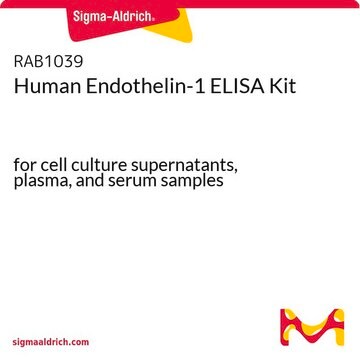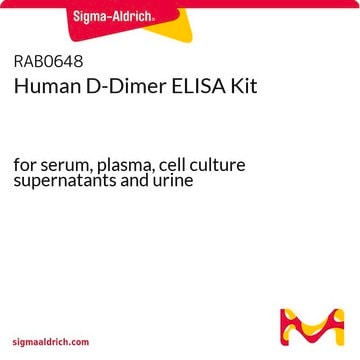RAB1057
Human HIF-1 alpha ELISA Kit
for cell culture supernatants, plasma, and serum samples
Sign Into View Organizational & Contract Pricing
All Photos(1)
About This Item
UNSPSC Code:
41116158
NACRES:
NA.32
Recommended Products
species reactivity
human, mouse
packaging
kit of 96 wells (12 strips x 8 wells)
technique(s)
ELISA: suitable
input
sample type serum sample(s)
sample type cell culture supernatant(s)
sample type plasma
assay range
inter-assay cv: <12%
intra-assay cv: <10%
sensitivity: 61 pg/ml
detection method
colorimetric
shipped in
wet ice
storage temp.
−20°C
Gene Information
human ... HIF1A(3091)
General description
This ELISA antibody pair detects human and mouse HIF-1apha. Other species are not determined.
Application
For research use only. Not for use in diagnostic procedures.
Please refer to the attached Protocolfor details.
Please refer to the attached Protocolfor details.
Other Notes
A sample Certificate of Analysis is available for this product. Please type the word sample in the text box provided for lot number.
Signal Word
Warning
Hazard Statements
Precautionary Statements
Hazard Classifications
Met. Corr. 1
Storage Class Code
8A - Combustible corrosive hazardous materials
Flash Point(F)
Not applicable
Flash Point(C)
Not applicable
Choose from one of the most recent versions:
Already Own This Product?
Find documentation for the products that you have recently purchased in the Document Library.
Lissa N Francois et al.
Placenta, 51, 57-63 (2017-03-16)
The BCRP/ABCG2 efflux transporter protects the developing fetus by limiting the transplacental transfer of drugs and chemicals and prevents the apoptosis of trophoblasts. The purpose of this study was to determine whether hypoxia-related signaling alters placental BCRP expression and function
Lucia Bialesova et al.
Oncotarget, 8(44), 76622-76633 (2017-11-05)
The two estrogen receptor (ER) subtypes, ERα and ERβ, belong to the nuclear receptor superfamily. The human ERβ variant ERβ2 is proposed to be expressed at higher levels than ERβ1 in many breast tumors and it has been suggested that
Tatyana Merkulova-Rainon et al.
Angiogenesis, 21(3), 557-569 (2018-03-09)
The pathophysiology of sporadic Alzheimer's disease (AD) remains uncertain. Along with brain amyloid-β (Aβ) deposits and neurofibrillary tangles, cerebrovascular dysfunction is increasingly recognized as fundamental to the pathogenesis of AD. Using an experimental model of limb ischemia in transgenic APPPS1
Naoto Tani et al.
Human cell, 33(3), 545-558 (2020-03-09)
This study aimed to investigate the usefulness of the thyroid-related hormones as markers of acute systemic hypoxia/ischemia to identify deaths caused by asphyxiation due to neck compression in human autopsy cases. The following deaths from pathophysiological conditions were examined: mechanical
Our team of scientists has experience in all areas of research including Life Science, Material Science, Chemical Synthesis, Chromatography, Analytical and many others.
Contact Technical Service









